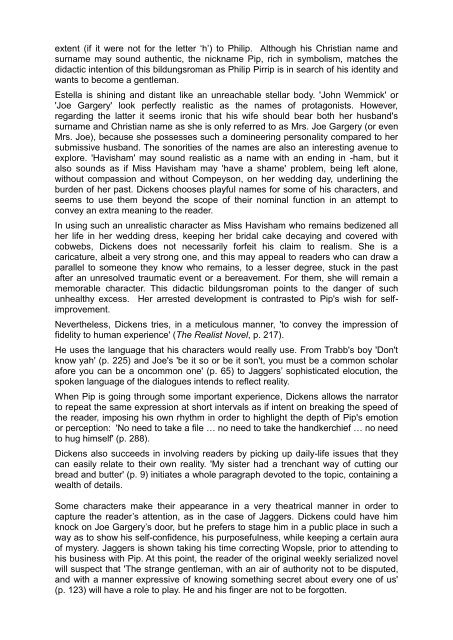Psychological Realism in Dickens' Great Expectations ... - lembeye.fr
Psychological Realism in Dickens' Great Expectations ... - lembeye.fr
Psychological Realism in Dickens' Great Expectations ... - lembeye.fr
Create successful ePaper yourself
Turn your PDF publications into a flip-book with our unique Google optimized e-Paper software.
extent (if it were not for the letter ‘h’) to Philip. Although his Christian name and<br />
surname may sound authentic, the nickname Pip, rich <strong>in</strong> symbolism, matches the<br />
didactic <strong>in</strong>tention of this bildungsroman as Philip Pirrip is <strong>in</strong> search of his identity and<br />
wants to become a gentleman.<br />
Estella is sh<strong>in</strong><strong>in</strong>g and distant like an unreachable stellar body. 'John Wemmick' or<br />
'Joe Gargery' look perfectly realistic as the names of protagonists. However,<br />
regard<strong>in</strong>g the latter it seems ironic that his wife should bear both her husband's<br />
surname and Christian name as she is only referred to as Mrs. Joe Gargery (or even<br />
Mrs. Joe), because she possesses such a dom<strong>in</strong>eer<strong>in</strong>g personality compared to her<br />
submissive husband. The sonorities of the names are also an <strong>in</strong>terest<strong>in</strong>g avenue to<br />
explore. 'Havisham' may sound realistic as a name with an end<strong>in</strong>g <strong>in</strong> -ham, but it<br />
also sounds as if Miss Havisham may 'have a shame' problem, be<strong>in</strong>g left alone,<br />
without compassion and without Compeyson, on her wedd<strong>in</strong>g day, underl<strong>in</strong><strong>in</strong>g the<br />
burden of her past. Dickens chooses playful names for some of his characters, and<br />
seems to use them beyond the scope of their nom<strong>in</strong>al function <strong>in</strong> an attempt to<br />
convey an extra mean<strong>in</strong>g to the reader.<br />
In us<strong>in</strong>g such an unrealistic character as Miss Havisham who rema<strong>in</strong>s bedizened all<br />
her life <strong>in</strong> her wedd<strong>in</strong>g dress, keep<strong>in</strong>g her bridal cake decay<strong>in</strong>g and covered with<br />
cobwebs, Dickens does not necessarily forfeit his claim to realism. She is a<br />
caricature, albeit a very strong one, and this may appeal to readers who can draw a<br />
parallel to someone they know who rema<strong>in</strong>s, to a lesser degree, stuck <strong>in</strong> the past<br />
after an unresolved traumatic event or a bereavement. For them, she will rema<strong>in</strong> a<br />
memorable character. This didactic bildungsroman po<strong>in</strong>ts to the danger of such<br />
unhealthy excess. Her arrested development is contrasted to Pip's wish for selfimprovement.<br />
Nevertheless, Dickens tries, <strong>in</strong> a meticulous manner, 'to convey the impression of<br />
fidelity to human experience' (The Realist Novel, p. 217).<br />
He uses the language that his characters would really use. From Trabb's boy 'Don't<br />
know yah' (p. 225) and Joe's 'be it so or be it son't, you must be a common scholar<br />
afore you can be a oncommon one' (p. 65) to Jaggers’ sophisticated elocution, the<br />
spoken language of the dialogues <strong>in</strong>tends to reflect reality.<br />
When Pip is go<strong>in</strong>g through some important experience, Dickens allows the narrator<br />
to repeat the same expression at short <strong>in</strong>tervals as if <strong>in</strong>tent on break<strong>in</strong>g the speed of<br />
the reader, impos<strong>in</strong>g his own rhythm <strong>in</strong> order to highlight the depth of Pip's emotion<br />
or perception: 'No need to take a file … no need to take the handkerchief … no need<br />
to hug himself' (p. 288).<br />
Dickens also succeeds <strong>in</strong> <strong>in</strong>volv<strong>in</strong>g readers by pick<strong>in</strong>g up daily-life issues that they<br />
can easily relate to their own reality. 'My sister had a trenchant way of cutt<strong>in</strong>g our<br />
bread and butter' (p. 9) <strong>in</strong>itiates a whole paragraph devoted to the topic, conta<strong>in</strong><strong>in</strong>g a<br />
wealth of details.<br />
Some characters make their appearance <strong>in</strong> a very theatrical manner <strong>in</strong> order to<br />
capture the reader’s attention, as <strong>in</strong> the case of Jaggers. Dickens could have him<br />
knock on Joe Gargery’s door, but he prefers to stage him <strong>in</strong> a public place <strong>in</strong> such a<br />
way as to show his self-confidence, his purposefulness, while keep<strong>in</strong>g a certa<strong>in</strong> aura<br />
of mystery. Jaggers is shown tak<strong>in</strong>g his time correct<strong>in</strong>g Wopsle, prior to attend<strong>in</strong>g to<br />
his bus<strong>in</strong>ess with Pip. At this po<strong>in</strong>t, the reader of the orig<strong>in</strong>al weekly serialized novel<br />
will suspect that 'The strange gentleman, with an air of authority not to be disputed,<br />
and with a manner expressive of know<strong>in</strong>g someth<strong>in</strong>g secret about every one of us'<br />
(p. 123) will have a role to play. He and his f<strong>in</strong>ger are not to be forgotten.


